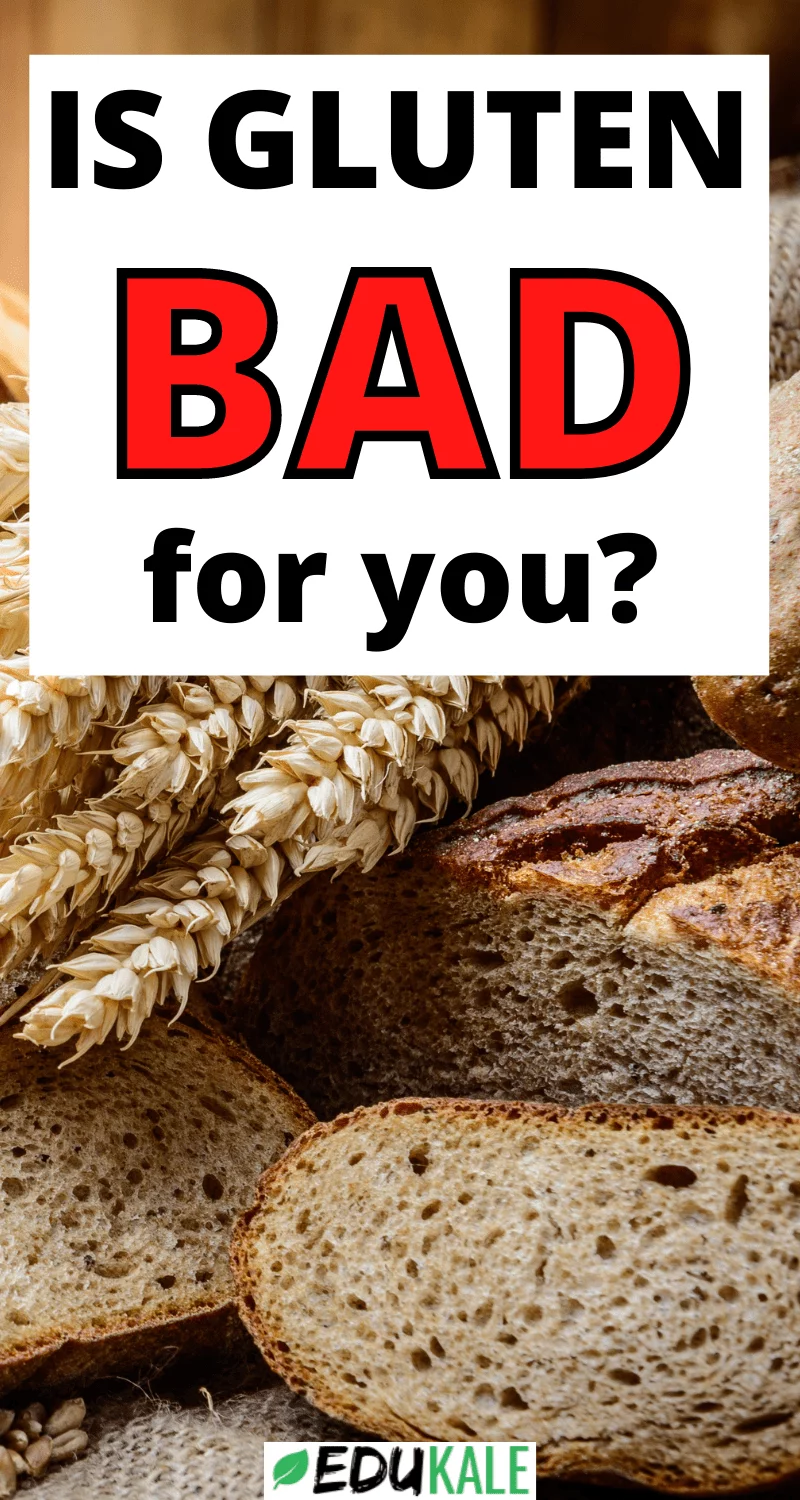This post contains affiliate links from which I may receive a small commission, at no extra cost to you. In no way does this affect my opinion or the information I provide on the product. Please read my disclaimer for more info.
Going gluten-free has become increasingly popular these past few years.
Gluten-free products are flourishing and gluten is getting banned from a lot of people’s plates. Among the reasons for going gluten-free are gluten-sensitivity and celiac disease, but also weight loss or curing gut inflammation.
But is gluten actually bad for you? Here’s the truth about gluten and whether or not you should go gluten-free.

What is gluten?
Gluten is the general name for the prolamine proteins found in wheat, barley, and rye. Gluten is made up of hundreds of different proteins, but the main ones are gliadin and glutenin, found in wheat.
They are very elastic, providing the food with a chewy texture and helping it maintain its shape [1].
You can find gluten in foods such as bread, pasta, cereal, beer, baked goods made with flour (cake, cookies, pancakes…), and tons of ready-made products such as soups, sauces, crackers, etc.

IS GLUTEN BAD FOR YOU?
Many people claim that adopting a gluten-free lifestyle has health benefits such as weight-loss, less bloating, more energy, no abdominal pain, etc.
But is this actually true?
Well, it’s important to differentiate those who suffer from celiac diseases (around 1% of the population) or gluten sensitivity (less than 1% of the population) from those who don’t [2].
For these individuals, gluten should absolutely be avoided. The proteins that make up gluten are very long and difficult to digest.
For those suffering from celiac disease or gluten intolerance, the large peptides that form from this incomplete digestion can cross the barrier of the small intestine [3]. This can trigger an immune response and inflammation, which can damage their intestine’s lining over time.
This results in a lot of pain and the malabsorption of certain nutrients [4,5]. Symptoms of this issue include weight loss, diarrhea, anemia, osteoporosis, skin diseases…[6].
The only way to stop experiencing these symptoms is to completely avoid gluten consumption, which requires a lot of effort as gluten is found in a plethora of food items.
So if you are one of these individuals (you can be diagnosed by intestinal biopsy or with a blood test for celiac disease), then yes, gluten is bad for you.
But what about the rest of the population?

Why you shouldn’t go gluten-free.
So many people who don’t suffer from celiac disease/gluten sensitivity are adopting a gluten-free diet. However, studies show that these people get no benefits from this diet, and may even be putting themselves at risk for possible nutritional deficiencies and psychosocial implications [7].
Indeed, gluten is such a huge component of the Western diet that cutting it out without proper compensation may lead to certain deficiencies.
Many gluten-containing foods like whole grains are filled with nutrients that are very important for good health, such as fiber.
Indeed, fiber is packed with great health benefits. Fiber-rich foods help you maintain a healthy weight and make your good gut bacteria thrive. Fiber can also prevent diseases such as diabetes, heart disease, or obesity, and improve your digestion.
(Read my article on the benefits of fiber-rich foods for more information) Cutting out gluten means cutting out a bunch of healthy fiber-rich foods for no reason, which is unfortunate.
Studies [8, 9] also show that many gluten-free foods are not enriched and may be deficient in nutrients like folate, iron, niacin, riboflavin, and thiamine.
Gluten-free foods also contain higher levels of lipids, trans fat, and salt than their gluten-containing counterparts. A study [10] that analyzed over 3000 food products found that gluten-free foods were not superior to those who did contain gluten.
On the contrary, they had lower protein and fiber content, and people on a gluten-free diet did not consume enough nutrient-dense foods to meet all of their nutritional recommendations.
A study [11] also showed that consuming gluten was associated with a lower risk of coronary heart disease. This could be because avoiding gluten means cutting out beneficial whole grains, which are associated with improved cardiovascular disease outcomes and healthier lifestyles [12].
Gluten intake is also inversely associated with diabetes [13], meaning that people who consumed more gluten had less chances of developing type 2 diabetes. Again, this is likely because limiting gluten means limiting beneficial cereal fiber that contributes to good health.
Other reasons for not going gluten-free involve the limited availability and increased financial cost of gluten-free products [14], and the psychological impact of following a restrictive diet and lifestyle, which can negatively affect social life [15].
As for the argument that our ancestors didn’t eat gluten, well, first of all, it may not even be true. The analysis of their tools and teeth showed that they consumed grains, legumes, starches…
And even if they didn’t, our diets are just too different for gluten to actually have an impact. Even the fruit and vegetables we eat now have been genetically modified and don’t resemble the ones our ancestors ate. So there’s really no point in cutting out gluten in an attempt to mimic our ancestors’ diet [16].

But why do I feel better when I cut out gluten?
It’s not uncommon for people to feel better after going gluten-free, even if they aren’t intolerant to gluten. This is because cutting out gluten often involves cutting out a lot of processed foods like fast food, cakes and cookies, sugar-filled cereal, etc.
However, the gluten in these foods isn’t the problem— the high-calorie/low-nutrient/high-sugar/high-fat combo is. Many people say that cutting out these foods leads to weight loss, less digestive issues, feeling more energized, being in a better mood, etc.
People are likely to attribute these benefits to cutting out gluten, but it often isn’t the reality. What is actually happening is that people are eating less unhealthy processed foods and replacing them with more fruit, vegetables, and healthy proteins.
If you feel like this is the case for you, I recommended getting tested so that you know whether the benefits are actually linked to cutting out gluten or not.
Studies [17] also suggest that if you suffer from irritable bowel syndrome (IBS) and that a low gluten diet improves your symptoms, FODMAPS may be the reason why, rather than gluten.
These are fermentable saccharides and polyols found in foods like wheat or beans that are resistant to digestion. A diet low in FODMAPS may be more effective in this case.
Another study [18] showed that, for people on low FODMAPS diet, gluten had no effect and was not a trigger of their functional gut symptoms.

Is gluten bad for you in conclusion.
Gluten refers to the different proteins found in grains such as pasta, bread, cereal, flour, barley, etc. While more and more people are choosing to go gluten-free, the evidence does not support this.
Unless you are suffering from celiac disease or gluten sensitivity (in which case you should absolutely go gluten-free), the cons of cutting out gluten outweigh the pros.
It can lead to nutritional deficiencies, a lack of important fiber, and is correlated with an increase in certain diseases. While giving up cupcakes may be beneficial, depriving yourself of healthy gluten-containing foods like oatmeal or whole-wheat foods really is a shame.
Instead of going gluten-free, stick to eating whole, healthy foods such as whole grains, healthy proteins and fats, and fruit and vegetables!
-Lucie


Comments are closed.